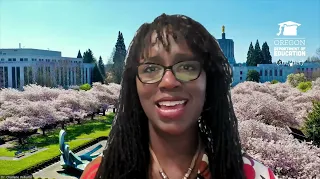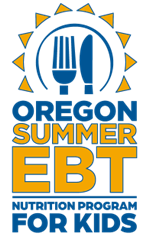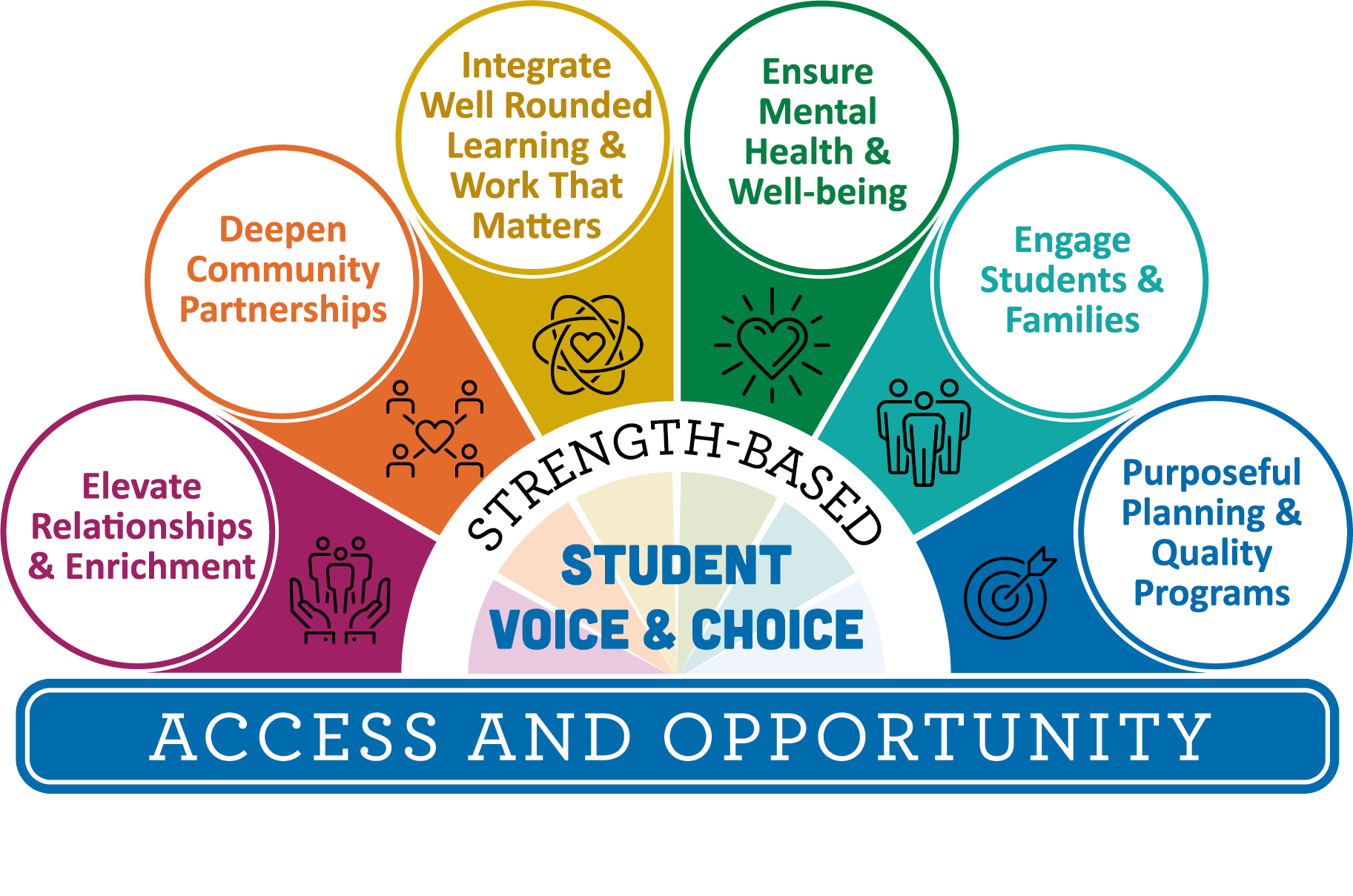Congratulations to the Class of 2024!
Click on the picture below to watch ODE Director Dr. Charlene Williams’ message to the graduating class of 2024!

Happy Juneteenth!
 Juneteenth celebrates the date, June 19, 1865, when Union troops reached Galveston Bay, Texas, to inform the enslaved African-Americans there that they, along with the more than 250,000 other enslaved black people in the state, were freed by the Emancipation Proclamation. Even though the holiday occurs when most schools are on summer break, the events and symbolism of the holiday are important aspects of our nation's history and civic knowledge that students can explore in the final weeks of school or throughout the year when learning about civic holidays, civil rights, democracy and U.S. History.
Juneteenth celebrates the date, June 19, 1865, when Union troops reached Galveston Bay, Texas, to inform the enslaved African-Americans there that they, along with the more than 250,000 other enslaved black people in the state, were freed by the Emancipation Proclamation. Even though the holiday occurs when most schools are on summer break, the events and symbolism of the holiday are important aspects of our nation's history and civic knowledge that students can explore in the final weeks of school or throughout the year when learning about civic holidays, civil rights, democracy and U.S. History.
Juneteenth Teaching Resources:
New food benefits for children coming soon
 Summer EBT is a new grocery benefits program that starts this summer. It helps families buy food for their school-aged children during the summer when school is out. Families will get $120 for each eligible child. They will receive the benefits in one payment on an Oregon EBT card.
Summer EBT is a new grocery benefits program that starts this summer. It helps families buy food for their school-aged children during the summer when school is out. Families will get $120 for each eligible child. They will receive the benefits in one payment on an Oregon EBT card.
Families that have SNAP, TANF or OHP don’t need to apply. Summer EBT food benefits will be added to their Oregon EBT card automatically. Families will get a letter for each eligible child by mail or email when their benefits have been sent.
Families that do not have SNAP, TANF or OHP and may be eligible will need to apply. Children are likely to qualify if they go to schools with free or reduced-price meal programs and live in households that meet income requirements for those programs. Families can go to
sebt.oregon.gov to check if their child may be eligible. They can also sign up to get a notification by text or email when it’s time to fill out and submit the application.
For more information,
read the joint release sent out last week by ODE and the Department of Human Services and visit
sebt.oregon.gov or
ebtv.oregon.gov for Spanish language content.
Make every summer a season of learning for Oregon's kids

(The following op-ed was
published in the Portland Tribune on June 6, 2024.)
In Oregon, summer is another season for learning.
This week, thanks to Gov. Tina Kotek and the State Legislature, school districts and communities throughout Oregon will start shifting their campuses toward
Summer Learning.
Through the state’s $30 million investment, young scholars can engage in innovative and inclusive educational opportunities over the next few months.
This funding reaches throughout the state — including 43 school districts and 13 education service districts partnering with more than 130 community organizations — and will directly impact more than 50,000 K-12 children statewide.
This isn’t just about addressing unfinished learning; it’s about reimagining summer as a season for deep, enriching learning experiences that go beyond traditional classroom walls.
Summer Learning provides hands-on, inquiry-based learning that includes everything from exploring robotics, vibrant reading discussions, and math instruction, to visits to libraries and museums and other opportunities for outdoor exploration. Summer Learning engages both head and heart.
One of the most exciting aspects of this year’s initiative is the deep involvement of communities and organizations.
From local libraries and museums offering special projects, to businesses and nonprofits providing real-world experiences, these partnerships enrich the curriculum and link students to their communities in meaningful ways.
Summer Learning, not summer school
Summer learning is a well-researched strategy for Oregon schools to increase instructional time, improve attendance and connectedness to school, and dramatically accelerate and expand learning opportunities.
Summer Learning will foster success for Oregon students by improving readiness to learn, academic growth, and providing safe, healthy, and enriching ways for children to grow during the summer months.
Unlike previous summer school models, which often carried a remedial or punitive stigma, Summer Learning is a proactive, engaging experience that includes exciting educational opportunities, community projects, and real-world applications.
Summer Learning programs are expected to deliver at least 80 hours of programming that aligns to academic content standards in math, science, language arts and financial education. Lessons will promote hands-on and project-based learning and structure the environment and communication in ways that engage families and community partners.
Accountable and sustainable
ODE has developed a framework to ensure Summer Learning programs are both impactful and measurable.
This isn’t a loosely defined program but a well-structured, purpose-driven endeavor with clear expectations.
By setting specific benchmarks and employing mechanisms for evaluation, we can ensure these experiences genuinely contribute to students’ educational trajectories.
By planfully implementing Summer Learning programs, communities can build sustainable programming that serves generations of young scholars year after year.
We can start to see shifts in outcomes for students that include both higher graduation rates as well as elevated academic performance in literacy and math.
By demonstrating the success and benefits of this summer’s programs, we aim to secure ongoing funding, ensuring that Summer Learning becomes an integral, annual part of our educational system.
Succeeding through partnership with communities and tribes
The Summer Learning grants for 2024 focus on historically underserved students and head directly to schools and school districts with pre-existing plans for summer programming while prioritizing collaboration with community partners and tribal nations.
Community input and leadership are crucial to success. Schools and districts can’t and should not, do this alone.
School districts receiving monies are required to have at least one partnership with the community.
YMCAs, Boys and Girls Clubs, Tribes, counties, cities, libraries, and other non-profit and community organizations in communities throughout Oregon are ready to collaborate. They offer unique and vital supports and services.
Deep research backs this approach
As we consider the potential of summer as a pivotal time for learning, it’s important to recognize that the concept of Summer Learning is a well-founded strategy supported by a wealth of research.
Studies consistently demonstrate that structured Summer Learning programs substantially contribute to academic achievement and effectively narrow opportunity gaps.
This evidence confirms that students who engage in these programs not only improve core math and reading skills, but are also more likely to graduate from high school and pursue higher education.
The evidence shows that by investing in Summer Learning, we are supporting students to develop critical thinking skills, promoting social-emotional well-being, and inspiring future leaders in the community.
OSCIM Program Continues to Help Districts with Construction Projects
 Last month, six school districts around the state passed bond measures that got a boost from the
Oregon School Capital Improvement Matching (OSCIM) Program. Commitments are made to districts ahead of the election so districts can inform their communities of the potential for additional funds from the state if the local bond passes. Before submitting an application for the OSCIM Program, districts must also submit a Facilities Assessment and Long-Range Facility Plan. Districts are awarded grants based on their position on the Priority List or First in Time List.
Last month, six school districts around the state passed bond measures that got a boost from the
Oregon School Capital Improvement Matching (OSCIM) Program. Commitments are made to districts ahead of the election so districts can inform their communities of the potential for additional funds from the state if the local bond passes. Before submitting an application for the OSCIM Program, districts must also submit a Facilities Assessment and Long-Range Facility Plan. Districts are awarded grants based on their position on the Priority List or First in Time List.
Since the first round of grants in 2016, the OSCIM program has awarded more than $444 million in matching funds that added to $7.5 billion in bonds approved by voters. Here are the districts receiving matching funds following successful bond elections last month:
| District Name | Local Bond Amount | OSCIM Grant |
|---|
| Banks SD 13 | $49,310,000 | $6,000,000 |
| Fern Ridge SD 28J | $15,600,000 | $6,000,000 |
| Gervais SD 1 | $28,130,000 | $6,000,000 |
| Molalla River SD 35 | $77,460,000 | $6,000,000 |
| Oakland SD 1 | $4,500,000 | $4,500,000 |
| Willamina SD 30J | $2,500,000 | $2,500,000 |
ODE In the News
The Oregon Capital Chronicle highlighted how the Early Literacy Success Initiative is serving students around the state.
The Woodburn Independent went to St. Paul Elementary School to see an example of the Tribal History/Shared History curriculum in action.
Several news outlets reported on
The Oregon Plan, which offers high school students paid opportunities to learn professional technical training while earning high school credit: